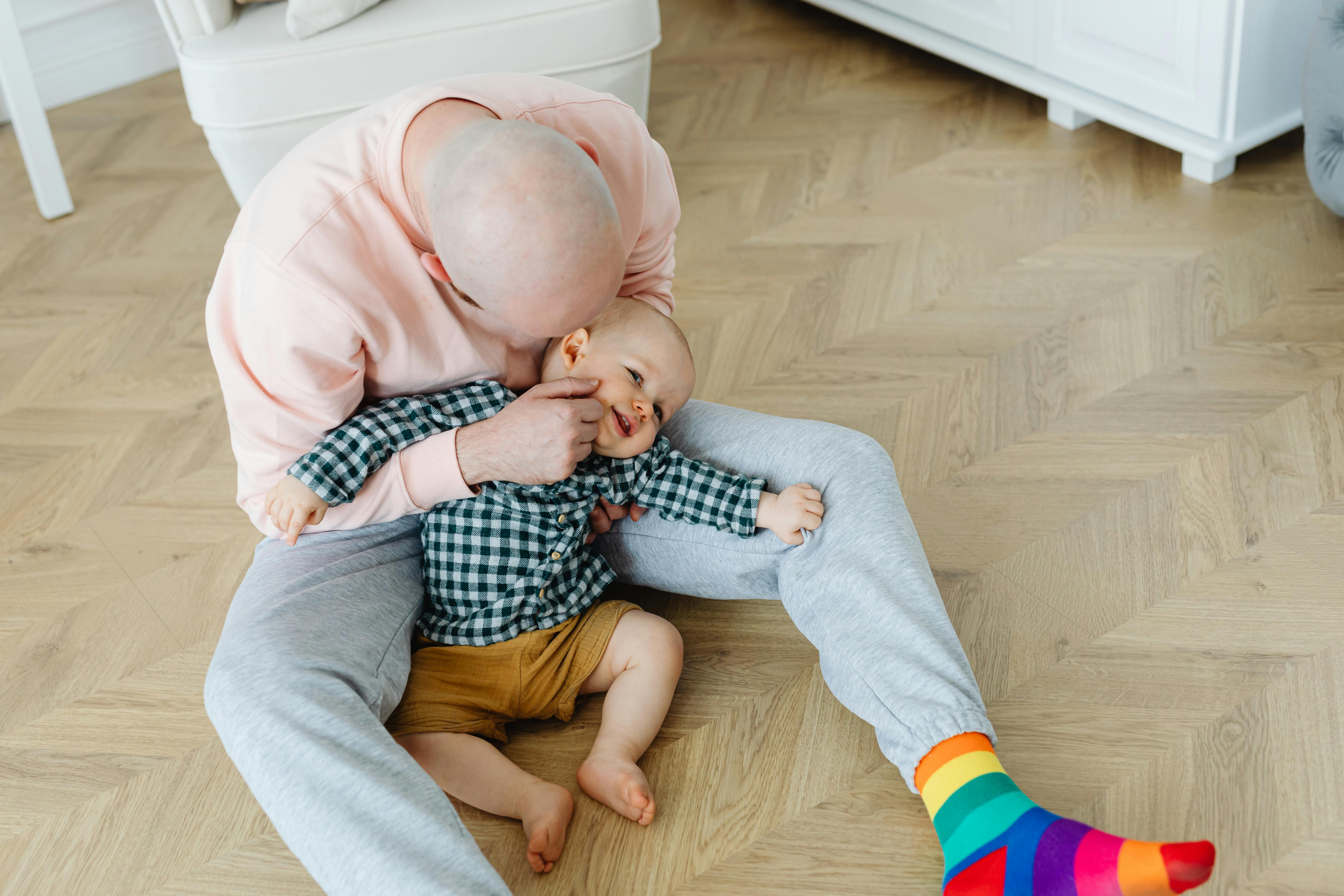Are you wondering why your baby is pinching you? It’s common for babies to pinch, grab, and pull on their caregivers as they explore the world around them. This behavior is a normal part of development and helps them to learn about the world and their own bodies. In this article, we’ll look at why your baby might be pinching you, what to do when it happens, and how to help them grow out of this behavior.A baby may pinch as a form of communication when they are unable to express themselves in other ways. This behavior may arise from frustration, curiosity, or even a desire for attention. It is important to identify the cause of the pinching in order to appropriately address the behavior. Common reasons for a baby to pinch include wanting something that is out of reach, feeling overwhelmed in a particular situation, or attempting to communicate with someone.
Understanding Babies’ Developmental Stages
Understanding the developmental stages of babies is essential for parents and caregivers to be able to provide the best care possible. Babies go through several different stages of development over the first year of their lives, and it is important to be familiar with these milestones so that any potential delays or issues can be spotted early on.
Babies are born with a range of reflexes that help them to survive in the world around them. These include sucking, grasping, rooting, startle and stepping reflexes. These reflexes usually begin to fade around 2 months of age. During this time, babies will start to roll over and lift their heads when placed on their tummies. They will also begin to show increased interest in their environment by tracking objects with their eyes and reaching for toys.
By 4 months old, babies will have increased mobility and coordination, allowing them to sit up with support and hold objects for longer periods of time. They will also begin babbling and experimenting with different sounds as they try to communicate with those around them.
At 6 months old, most babies will be able to roll over both ways and sit up unassisted. They can also pick up small objects with their hands and pass them from one hand to another. Babies at this age are also starting to understand simple commands such as “no” or “come here” and respond in ways such as reaching out or making eye contact when spoken too.
By 9 months old, most babies will be crawling or cruising along furniture as they move around the house. They may also begin attempting simple words such as “mama” or “dada” as they experiment with language more extensively than before.
At 12 months old, most babies can stand unassisted for short periods of time. They may also take a few steps without assistance as they learn how to walk independently for the first time. This is an exciting milestone! In addition, many babies at this age are starting to use simple words more often as well as understand basic instructions such as “go get your toy” or “wave bye-bye”.
Overall, it is important for parents and caregivers to become familiar with the developmental milestones of infants so that any potential issues can be caught early on and addressed appropriately by a healthcare professional if needed.
Different Reasons Why Babies Pinch
Babies may pinch for a variety of reasons. Whenever a baby pinches, it is important to consider the context in which it is happening and the age of the baby. Common reasons why babies pinch include: exploring their environment, expressing emotions, and developing fine motor skills.
Exploring their environment is often a big reason why babies pinch. At this young age, they are still learning about the world around them. Pinching helps them to understand what different items feel like and how they react when touched. They may also be curious about how their own body parts feel and how they interact with others.
Expressing emotions can also be a cause of why babies pinch. They may not have the language skills yet to express their feelings or needs, so they resort to physical behaviors such as pinching or hitting. This can be especially true when they are feeling overwhelmed or frustrated. Babies may also pinch out of boredom if they are not being stimulated enough by their environment.
Finally, babies may also be developing fine motor skills when they pinch or grab onto objects with their fingers. As babies grow, they learn how to refine these skills and use them in other ways such as picking up small objects or using utensils to eat food.
Understanding why babies pinch can help parents respond accordingly and provide appropriate support for their children when needed. It is important to remember that all behavior has a reason behind it, even if we don’t always know what that reason is right away.
Identifying the Signs of Stress in Your Baby
It is important to be aware of the signs of stress in your baby. Babies are not able to verbalize their feelings, so it is up to parents and caregivers to watch for signs that may indicate stress. Common signs include changes in sleeping, eating, or crying patterns, inconsolable crying or irritability, difficulty self-soothing, and frequent need for physical contact. Babies may also become clingy, withdrawn, or start refusing activities they once enjoyed.
It is important to be mindful of any changes in your baby’s behavior that could indicate stress. Try to identify the source of the stress when possible and take steps to address it. If you are unable to determine the source of the stress or if your baby’s behavior does not improve after addressing it, consult your pediatrician for advice.
There are several strategies that can help reduce stress in babies. Establishing a regular routine will provide structure and security for your baby and help him/her feel safe. You can also practice calming techniques like swaddling or rocking with your baby when he/she is feeling anxious or overwhelmed. Singing lullabies or playing soothing music can help relax babies as well. Making sure babies get plenty of physical contact throughout the day will also help reduce their stress levels.
Parents should also be mindful of their own stress levels as this can have an effect on their baby’s wellbeing too. Taking time out for yourself when needed and seeking support from family members or friends can help reduce parental stress and provide a better environment for your baby to thrive in.
By recognizing the signs of stress in your baby and taking proactive steps to reduce it, you can ensure that both you and your little one stay happy and healthy.
Handling a Pinching Baby with Patience
Pinching can be a common behavior for babies, especially those who are just learning to explore the world around them. It is important to understand that babies are not doing this to deliberately hurt someone; instead, they are exploring their environment and discovering what different objects feel like. As parents, it can be difficult to handle a pinch from your little one and maintain your patience. However, it is possible to respond in a way that is both gentle and firm so that your baby learns how to interact with the world in a safe way.
The first step in handling a pinch from your baby is to remain calm. It can be frustrating when you’re trying to keep your baby safe but they don’t understand why they shouldn’t pinch or pull on something. Take a deep breath and remind yourself that your baby doesn’t know any better yet. Instead of yelling or becoming angry, try redirecting their attention away from whatever it is they’re pinching.
Next, hold your baby firmly but gently so they know that what they are doing is not okay but also that you still love them. Speak in a calm voice and explain why pinching isn’t acceptable behavior. For example, you could say “No pinching, we don’t want anyone or anything getting hurt.” As much as possible, try not to scold or shout at your baby as this may lead to confusion and distress.
Finally, offer alternatives for what your baby can do instead of pinching. You could suggest holding something soft or playing with toys instead. This will help them learn the difference between good and bad ways of interacting with their environment while also giving them something enjoyable to do instead of pinching.
Understanding why babies pinch can help you respond more effectively when it happens and maintain the patience you need when dealing with this behavior. With consistent intervention and guidance, babies will soon learn healthy ways of interacting with their world around them without resorting to pinching or pulling on things.

The Impact of Physical Touch on Infants
Physical touch is an important part of a baby’s development. It helps to strengthen the bond between the baby and his or her parents, as well as aiding in the baby’s physical and emotional growth. Studies have shown that infants who receive more physical touch are more likely to develop better social skills, better communication abilities, and have higher self-esteem. Physical touch also helps to regulate the infant’s body temperature, heart rate, and breathing rate. This is especially beneficial for premature babies who may not be able to regulate their body temperature on their own.
In addition to its physical benefits, physical touch can also help with emotional development. Skin-to-skin contact triggers the release of hormones like oxytocin and endorphins which help to reduce stress and promote feelings of security and comfort in the infant. Research has also shown that infants who are touched more often are more likely to be better adjusted emotionally throughout their lives.
Physical touch can take many forms such as cuddling, rocking, stroking, massaging or even just holding hands. All of these forms can be beneficial for a baby’s development but it is important that they are done with love and care in order for them to have a positive effect on the infant. Parents should also try to incorporate some form of physical activity into playtime with their babies as this can help them to learn about their bodies in a fun way.
Overall, physical touch is an essential part of a baby’s development and it should not be underestimated. The benefits that it provides will last long after infancy has ended so it is important that parents take advantage of this powerful tool while their babies are still young.
Recognizing the Difference Between Painful and Uncomfortable Pinching
Pinching can be a difficult sensation to understand. It’s a unique pain that can cause distress, confusion, and even fear. Knowing the difference between painful and uncomfortable pinching can help you identify and manage the feeling better.
Painful pinching is a sharp, intense sensation that typically occurs when an object is compressed against your skin. It often results in minor physical trauma, such as bruising or puncture wounds. Painful pinching can be accompanied by swelling, redness, and tenderness in the area.
Uncomfortable pinching is different than painful pinching because it doesn’t typically cause physical damage to the skin or tissue. Instead, it’s more of an annoying sensation that may be felt when something rubs against your skin or when something tight is worn for too long. Uncomfortable pinching usually isn’t accompanied by any physical signs like redness or swelling.
It’s important to recognize the difference between painful and uncomfortable pinching in order to identify potential problems early on and take appropriate action to reduce discomfort and protect your skin from further injury. If you experience any type of pain or discomfort while pinched, it’s important to consult a medical professional for further evaluation.
Discouraging the Behaviour of a Pinching Baby
Pinching is an unpleasant behaviour that can be exhibited by babies and toddlers. It is important to discourage this behaviour as it can be harmful to both your baby and other people. There are several things parents can do to help discourage pinching in their baby or toddler.
First, it is important to stay calm when your baby or toddler is pinching. Reacting with anger or frustration will only reinforce the behaviour and make it more likely for it to continue. Instead, try to distract them with a toy or activity that they find enjoyable. This will help them redirect their energy away from pinching.
Second, provide your baby or toddler with positive reinforcement when they are not pinching. Praise them, give them hugs, and give them treats such as stickers or small toys when they use appropriate behaviour instead of pinching. This will help them understand that you approve of and appreciate when they are behaving appropriately.
Third, it is important to be consistent in your response to pinching behaviours. Whenever your baby attempts to pinch someone else, firmly tell them “no” and redirect their attention elsewhere. If the behaviour continues repeatedly, remove your child from the situation until they have calmed down and can engage in appropriate behaviour again.
Finally, if the pinching persists despite all of these efforts, it may be time to seek assistance from a professional such as a child psychologist or pediatrician. They may have additional strategies that you can use to help change your baby’s behaviour and provide better guidance on how best to handle the situation going forward.

Conclusion
Pinching is a normal behavior for babies as they explore the world around them. It’s important to remember that it doesn’t mean your baby doesn’t love you, they are just trying to find out how things feel and work. If your baby is pinching you, it’s best to calmly explain why it’s not okay and redirect their attention to something else.
Most importantly, if your baby is pinching you, stay calm and remember that this is a phase all babies go through. With patience and understanding, you can help them learn how to express themselves without hurting others.
Overall, while it can be frustrating when babies pinch us, it’s important to recognize that this behavior is part of normal development. With a little bit of patience and understanding we can help our babies learn appropriate ways of interacting with others.




